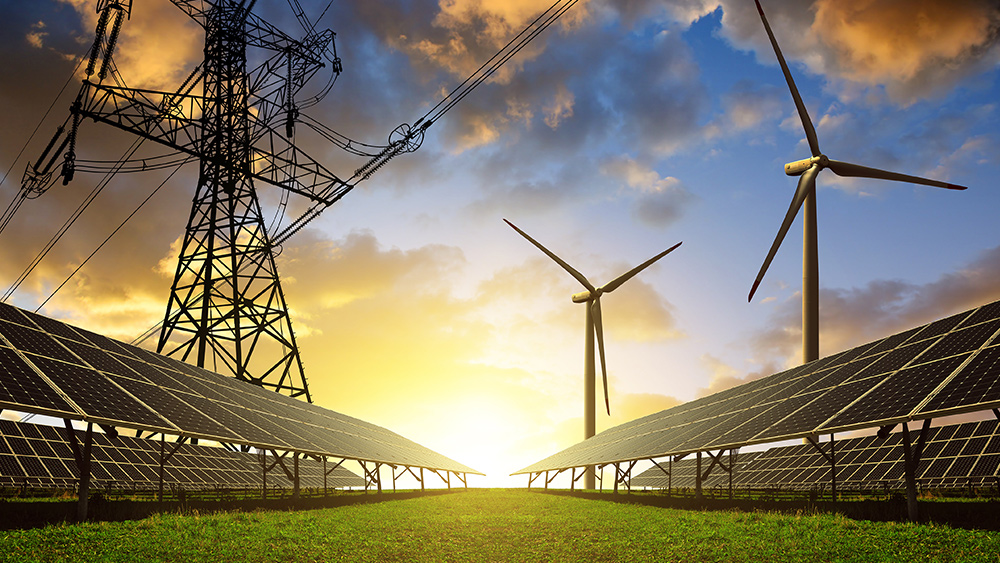 Parler
Parler Gab
Gab
Hundreds of millions of acres needed to handle Biden's green energy expansion plans
In practical terms, to fulfill President Joe Biden's goal of having an emission-free electricity grid by 2035, the U.S. needs to increase its carbon-free energy production capacity by at least 150 percent. According to an estimate by Princeton University, building 10 percent more wind, solar and hydropower generation per year until 2030 will require a chunk of land equal to the state of South Dakota. Today, only 81 million of the country's 2.43 billion acres of land is used to power the country's economy. The total footprint used up to generate hydro, nuclear, solar and wind energy is 16.13 million acres of land. Meanwhile, land currently used for fossil fuels – oil and gas drilling and fracking-sand mining sites, petroleum and gas pipeline easements, coal mining, transport and waste storage operations and fossil fuel power plants – use up just 8.55 million acres of land. Slightly more than half of what the U.S. currently uses for hydro, wind and solar generation, despite producing so much more energy for the country. Even if taking into account all of the land used for power lines to transmit the energy generated by fossil fuels across the country – 4.8 million acres – it still doesn't use up the same amount According to Princeton's analysis of various pathways for Biden to achieve his goal of having a carbon-free American economy by 2050 and how much land it would take, the most land-intensive plan eliminates all fossil fuels and nuclear plants. Wind and solar would provide 98 percent of all electric power by 2050, with additional energy needs to be met by a mix of batteries, hydropower and combustion turbines that burn carbon-free synthetic fuels and hydrogen. For this plan to make every single home, building, factory, electric vehicle and more in America run on clean energy, the U.S. energy footprint would need to quadruple in size, and wind farms alone would occupy land areas equivalent to Arkansas, Iowa, Kansas, Missouri, Nebraska and Oklahoma combined. This is equivalent to an additional 250 million acres of wind farms, 17 million more acres of solar farms and 15 million acres of offshore wind farms. "Is there even enough uninhabited land to build 250 million acres of new wind farms?" asked Dave Merrill, writing for Bloomberg. In Princeton's most optimistic estimates in the highest renewables scenario, 11 percent of electric power could come from offshore wind farms and another three percent of power could come from rooftop solar panels. This still leaves around 84 to 86 percent of energy generation left to massive wind and solar farms. Learn more about the government's forced transition to green energy at GreenTyranny.news. Watch this clip from InfoWars as host Owen Shroyer discusses why green energy policies will never work. This video is from the InfoWars channel on Brighteon.com.More related stories:
Wind turbine blades could account for more than 43 million tons of waste each year by 2050. Top power grid operator warns: More blackouts and energy shortages due to forced retirement of fossil fuel plants. Solar and wind can't replace fossil fuel, points out economist Peter Hartley. Shifting to green energy is currently impossible due to global shortage of batteries and minerals needed for energy storage. Wind and solar cannot replace oil: What we need is for the government to stop suppressing free energy. Sources include: ClimateDepot.com MSN.com Bloomberg.com Brighteon.comStudy: 360M-year-old fossil from Ireland proves plants are capable of self-defense
By Zoey Sky // Share
U.S. rulers launch ANOTHER “ministry of truth”
By News Editors // Share
Energy commissioner warns: America heading toward power grid “reliability crisis”
By Ethan Huff // Share
RFK Jr. commits to making America an EXEMPLARY DEMOCRACY again in 2024 presidential bid
By Belle Carter // Share
Slowing fuel demand stokes fears of impending RECESSION in the US
By Kevin Hughes // Share
Spain’s ongoing DROUGHT pushes global olive oil prices to 26-year high
By Ramon Tomey // Share
Governments continue to obscure COVID-19 vaccine data amid rising concerns over excess deaths
By patricklewis // Share
Tech giant Microsoft backs EXTINCTION with its support of carbon capture programs
By ramontomeydw // Share
Germany to resume arms exports to Israel despite repeated ceasefire violations
By isabelle // Share










